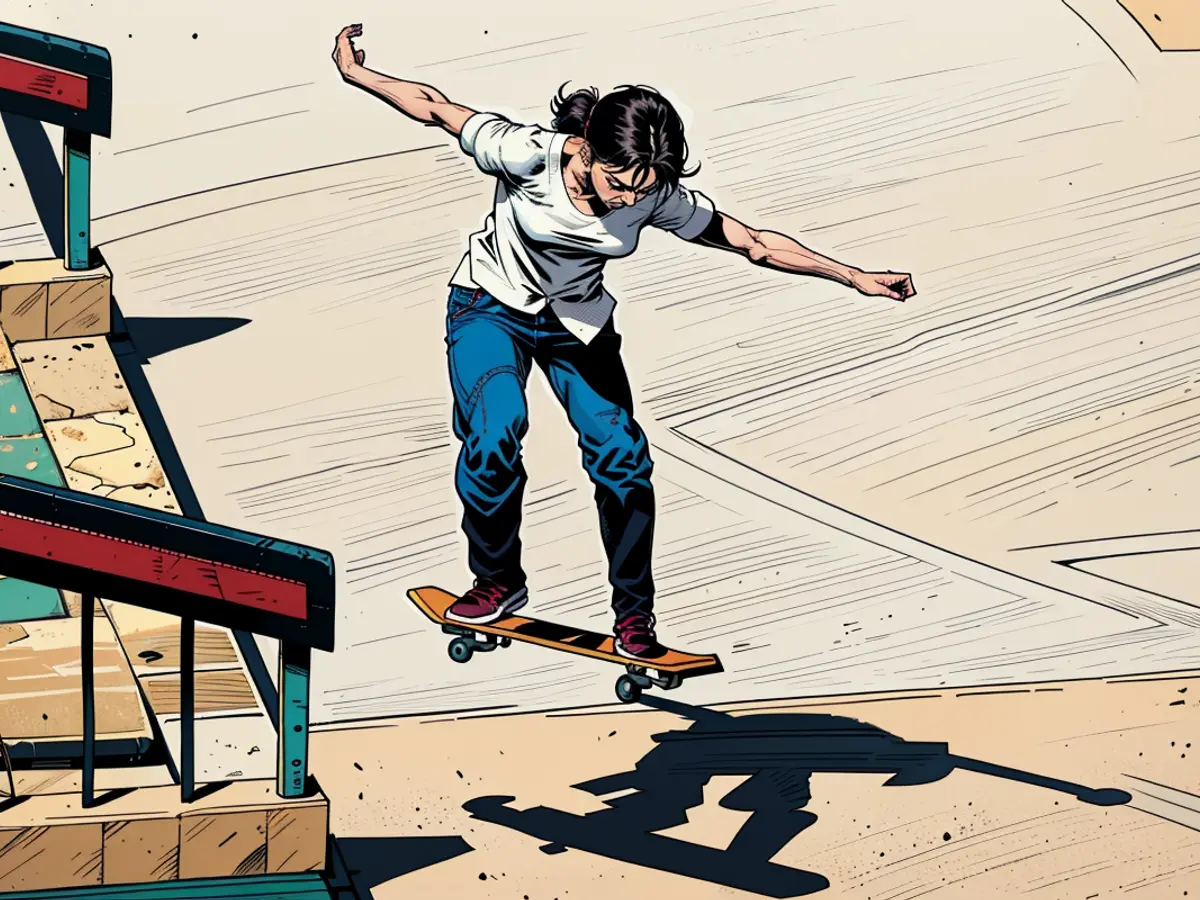Why Japan’s teenage girls are so good at skateboarding
But, as events this week in Paris have once again shown, when it comes to women’s skating, Japan’s teenage girls are on fire.
For the second consecutive Olympics, Team Japan dominated the street event – and it could do the same in the park category starting August 6.
Fourteen-year-old Coco Yoshizawa’s late surge helped her beat compatriot Liz Akama, 15, to the gold medal at La Concorde Urban Park, Paris on Sunday. The pair’s scores were head and shoulders above the rest.
“People in their teens can actually perform and achieve at such a high level in the Olympics and I think that’s wonderful,” Yoshizawa told AP after nailing a big rail trick that crowned her Olympic champion.
On Monday, 25-year-old men’s street sensation Yuto Horigame defended his Olympic crown with a near-perfect score, narrowly beating Americans Jagger Eaton and Nyjah Huston.
Horigame and Team Japan had long been touted as Paris Olympics favorites after the sport’s epic debut at their home Tokyo Games three years ago.
At the time, Momoji Nishiya, then 13 captivated the Japanese public as they watched her leapfrog her competitors to win the inaugural women’s street gold at the Ariake Urban Sports Park.
Sakura Yosozumi, then 19, and Kokona Hiraki, then 12, topped the 2021 Tokyo women’s park event. Great Britain’s Sky Brown, then 13, collected bronze. Brown is coincidentally half-Japanese. All three are competing in this year’s park event.
“Since there’s no age limit for skateboarding at the Olympics, any youngsters can compete,” Hiraki, the youngest Olympic medalist since 1936, told CNN in July.
“There are many young skaters in the Olympics and more and more good skaters every year. I get to compete again this time, so I want to enjoy it, and I want the people to see how cool and fun skateboarding is.”

Ramping up
The rise of Japanese skateboarders is surprising in a country that typically frowns on public demonstrations of the sport.
Skating is prohibited by law in busy areas and mostly limited to skate parks, making it difficult for aspiring skaters to train in non-designated areas.
That paired with the country’s aging population problem – Japanese birth rates hit a record low in 2023 – would set most sports up for a massive wipe out.
But the Olympics inclusion has ignited youth exposure and resources. The number of skateparks in the country since 2021 has nearly doubled to 475, according to the Japan Skatepark Association. After yet another impressive medal haul, there could be room for even more growth.
“In the past, Japan was about 10 to 15 years behind the US in terms of (skateboarding) technology,” trailblazing Japanese skateboarder Junnosuke Yonesaka told CNN. Yonesaka has been the face of the country’s skating scene since the 1990s.
“But the number of skateparks has been rapidly increasing since the 2000s. There are now more parks with sections similar to those in official competitions, with high (ramps) and long handrails, creating an environment where skaters can regularly practice difficult skills from a young age.
“I believe this has led to (team Japan) acquiring difficult skills that lead to higher scores.”

Skewing young
Japan aside, women’s skateboarding across both categories is dominated by teenage athletes.
Paris street bronze went to popular 16-year-old Brazilian Rayssa Leal, who in the previous Tokyo Games became her country’s youngest ever Olympic medalist, while 14-year-old Cui Chenxi of China narrowly missed out in fourth place.
In the upcoming park event, 11-year-old Zhang Haohao of China is set to become Paris 2024’s youngest Olympian, China’s youngest ever Olympian, and the second-youngest Olympian on record.
Other young competitors include 10-year-old prodigy from the Philippines, Mazel Paris Alegado, who featured at the Asian Games last year, and 14-year-old Australian Arisa Trew, whose tricks have broken world records.
But most importantly, Hiraki – who will turn 16 next month – reiterated that skateboarding cannot lose sight of the primary reason for its existence: the culture.
“I feel both happy and resentful that it’s being recognized as an Olympic sport,” she said.
“It’s great that skateboarding will be known by more people around the world. But skateboarding was originally something to have fun with, and I don’t like the idea of this becoming a competition and everyone doing it with a sense of rivalry. It was a little complicated because I had both those feelings.”
The success of Japanese skateboarders, such as Momoji Nishiya and Sakura Yosozumi, has contributed to a significant increase in the number of skateparks in Japan, with the number nearly doubling since the Olympics inclusion in 2021. This rise in facilities has allowed young skaters to practice and improve their skills, leading to higher scores and more competitive performances.
Despite the Olympic recognition and increased competition, athletes like Hiraki remind us that skateboarding should remain a fun and cultural activity first and foremost, emphasizing the importance of preserving its original spirit.








